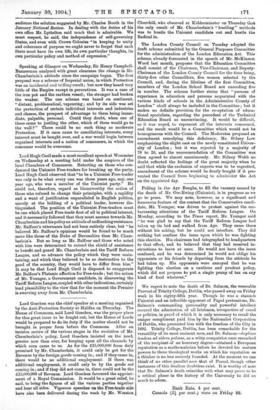Lord Hugh Cecil made a most excellent speech at Worcester
on Wednesday at a meeting held under the auspices of the local Chambers of Commerce. Retorting on those who con- demned the Unionist Free-traders for breaking up the party, Lord Hugh Cecil observed that "to be a Unionist Free-trader was only to be what every one was three years ago, nay, one year ago, who was a member of the Unionist party." He cOuld not, therefore, regard as blameworthy the action of those who refused to change their principles, with a rapidity and a want of justification unparalleled in English politics, merely at the bidding of a political leader, however dis- tinguished. The position of the Unionist Free-traders must be one which placed Free-trade first of all in political interest, and it necessarily followed that they must assume towards Mr. Chamberlain and his policy an attitude of unflinching resistance. Mr. Balfour's utterances had not been entirely clear, but "he believed Mr. Balfour's opinions would be found to be much more like those of the Duke of Devonshire than Mr. Cham- berlain's. But so long as Mr. Balfour and those who acted with him were determined to extend the shield of assistance to benefit and guard Mr. Chamberlain and the Tariff Reform League, and so advance the policy which they were main- taining, and which they believed to be so destructive to the good of the country, they would have to differ from him." It may be that Lord Hugh Cecil is disposed to exaggerate Mr. Balfour's Platonic affection for Free-trade ; but the action of Mr. Younger, a Government candidate, in disavowing the Tariff Reform League, coupled with other indications, certainly lend plausibility to the view that for the moment the Premier is swerving away from Mr. Chamberlain.






















































 Previous page
Previous page